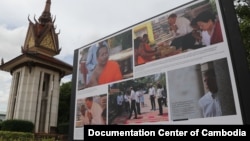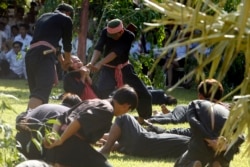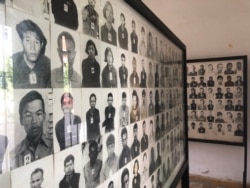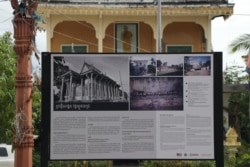Victims of the Khmer Rouge and advocates have called on the Cambodian government to continue the commemoration of the Day of Remembrance, which was a collective reparations project to honor the victims and give voice to the survivors of the brutal regime.
The Day of Remembrance, which used to be called the National Day of Hatred, is marked on May 20 and was declared a national holiday in 2018. After only one year, the holiday was canceled as part of the government’s efforts to increase workdays in the year.
Victims have used the day as a way to express their experiences of the 1970s Khmer Rouge regime while highlighting atrocities. The government and Khmer Rouge Tribunal mark the day with events across the country, including reenactments of the regime’s crimes at Choeung Ek Genocidal Center.
The day was first initiated by the People’s Republic of Kampuchea in 1984 and called it the Day of Hatred. Celebrations involved angry speeches from senior government and Cambodian People’s Party leaders against the “Pol Pot-Ieng Sary-Khieu Samphan clique and the Sihanouk-Son Sann reactionary groups.”
After a civil party request within the UN-assisted Khmer Rouge tribunal and as part of a reparations project, a 2011 government letter stated that the state “agreed to grant, in principle, the request made by the Civil Parties and other victims, designate the 20th of May as the National Day of Remembrance, an annual public holiday celebrated instead of the day of Anger or Memorial Day, which has been observed since 1984.”
This letter also noted that teaching history of the Khmer Rouge years would be included in the national curriculum for high school students.
Sum Rithy, a survivor of the regime and party to Case 003 against former Khmer Rouge Naval Commander Meas Muth, said victims wanted the day to be on April 17, to mark the day the genocidal regime took control of Phnom Penh and “atrocities began.”
“As the government suggested May 20, the Victims Support Section at the Khmer Rouge Tribunal decided to take May 20 and my group [of victims] agreed,” Sum Rithy recently told VOA Khmer.
Bryant Ben, a victim of the regime who lives in Long Beach, CA., said the Day of Remembrance is important because it denotes a respect for victims and invites the sharing of personal histories. He said the holiday helps keep the issue alive in the national conscience and society to learn from the past.
“Regularly we gather together to commemorate it and we understand that the past is at fault,” Bryant Ben said.
“[We] learn about the wrongdoings. We learn what is good, we do it better... and we change our minds.”
Katrina Natale, an American international legal consultant, who used to work with victims at the tribunal from 2010 to 2015, said that the issue of the date – whether to use May 20 or April 17 – for this holiday has been highly politicized in the past.
“In my experience, especially in working with Khmer Rouge victims at the court, victims have felt ambivalent about the May 20 holiday and many prefer and only really relate to the idea of there being a holiday on April 17, the true start of the suffering and trauma for many,” Katrina Natale said.
Natale said that events during the Khmer Rouge regime needed to be commemorated at the national level so that the “dignity and humanity” of the victims was restored.
While the national holiday was canceled starting this year, the Choeung Ek Genocidal Center and Tuol Sleng Genocide Museum were also closed in 2020 on account of the novel coronavirus pandemic, preventing commemoration of the day. The government had banned large public gatherings and shut down museums during the peak of the outbreak in Cambodia.
Youk Chhang, executive director of Documentation Center of Cambodia, said the government should take responsibility and maintain the holiday in an act of good faith for the millions affected by the Khmer Rouge’s brutal governance.
“When you know nothing can be healed, it's time to cry,’’ Youk Chhang said. ‘’And you need time to cry.”
“The commemoration of the day of remembrance regularly and publicly [marked] as the national event, I think it does not only help us all together not to forget, but to remember the past lessons for the young generation.’’
On May 20, at Wat Sguon Pich in Khan Kambol on the outskirts of Phnom Penh, U.S. Ambassador to Cambodia W. Patrick Murphy met survivors, and victims and villagers. Hundreds of Cambodians, researchers say, were killed there during the 1970s by the Democratic Kampuchea regime which converted the Buddhist temple into a prison.
Youk Chhang, who was at the pagoda that day, said it was important the ambassador visited on May 20 ‘’the killing site and the remains,’’ noting the location is one of the most notorious Khmer Rouge prisons in the vicinity of Phnom Penh.
Neth Pheaktra, a spokesman of the Khmer Rouge Tribunal, said that it was still possible to hold memorial services on May 20, and that government had only recently taken away the national holiday.
“In 2020, it is not a public holiday anymore because the Royal Government amended the public holiday [calendar],” he said.











